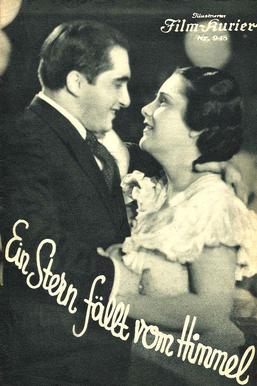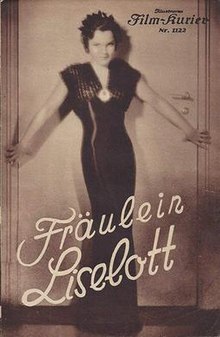
Hanussen is a 1955 West German drama film directed by O. W. Fischer and Georg Marischka and starring Fischer, Liselotte Pulver and Siegfried Lowitz. It was shot at the Bavaria Studios in Munich. The film's sets were designed by the art directors Robert Herlth and Hermann Warm.

Magdalena Maria Schneider was a German actress and singer. She was the mother of the actress Romy Schneider.

A Student's Song of Heidelberg is a 1930 German musical film directed by Karl Hartl and starring Hans Brausewetter, Betty Bird and Willi Forst. It marked Hartl's directoral debut. The film is in the tradition of the nostalgic Old Heidelberg.

Charley's Aunt is a 1934 German comedy film directed by Robert A. Stemmle and starring Fritz Rasp, Paul Kemp, and Max Gülstorff. It is based on the British writer Brandon Thomas's 1892 play Charley's Aunt. The film's sets were designed by art director Franz Schroedter.
A Man for My Wife is a 1943 German comedy film directed by Hubert Marischka and starring Magda Schneider, Johannes Riemann and Clementia Egies. The film's sets were designed by the art directors Hans Ledersteger and Ernst Richter.

Hotel by the Hour is a 1970 West German crime film directed by Rolf Olsen and starring Curd Jürgens, Andrea Rau, and Corny Collins. It is set in the red-light district of St. Pauli in Hamburg. A Stundenhotel is a hotel where rooms are let by the hour, similar to Japanese love hotels.

The House of Three Girls is a 1958 Austrian-West German musical film directed by Ernst Marischka and starring Karlheinz Böhm, Rudolf Schock and Magda Schneider. It is based on the operetta Das Dreimäderlhaus. The story had previously been made into the film Three Girls for Schubert in 1936.

A Star Fell from Heaven is a 1934 Austrian musical film directed by Max Neufeld and starring Joseph Schmidt, Egon von Jordan and Herbert Hübner. It was shot at the Sievering Studios in Vienna. Two years later it was remade in Britain with Schmidt reprising his role. A later German-language film A Star Fell from Heaven released in 1961, was unconnected to the earlier productions.
Marriage in Name Only is a 1930 German drama film directed by Heinz Paul and starring Evelyn Holt, Erika Dannhoff, and Wolfgang Zilzer.

Fritz and Friederike is a 1952 West German comedy film directed by Géza von Bolváry and starring Liselotte Pulver, Albert Lieven, and Margarete Haagen. It was made at the Wiesbaden Studios in Hesse. The film's sets were designed by the art directors Heinrich Beisenherz and Alfred Bütow.

Klettermaxe is a 1952 West German comedy crime film directed by Kurt Hoffmann and starring Liselotte Pulver, Albert Lieven and Charlott Daudert.

When the White Lilacs Bloom Again is a 1953 West German drama film directed by Hans Deppe and starring Willy Fritsch, Magda Schneider and Romy Schneider. It was shot at the Tempelhof Studios in West Berlin and on location around Wiesbaden in Hesse. The film's sets were designed by the art directors Alfred Bütow and Ernst Schomer.

Men Are That Way is a 1939 German drama film directed by Arthur Maria Rabenalt and starring Hertha Feiler, Hans Söhnker and Hans Olden. The film's sets were designed by the art director Willi Herrmann. It was remade by Rabenalt in Austria as Arena of Fear (1959).

Spring Song is a 1954 German-Italian drama film directed by Hans Albin, and starring Anne-Marie Blanc, René Deltgen, and Albert Lieven.

Ripening Youth is a 1955 West German drama film directed by Ulrich Erfurth and starring Adelheid Seeck, Maximilian Schell, and Albert Lieven. It was shot at the Göttingen Studios in Göttingen. The film's sets were designed by the art director Alfred Bütow.

Night of Decision is a 1956 West German drama film directed by Falk Harnack and starring Carl Raddatz, Hilde Krahl and Albert Lieven. It was shot at Göttingen Studios and on location in Belgium. The film's sets were designed by the art directors Walter Haag.

Sacred Lie is a 1955 West German drama film directed by Wolfgang Liebeneiner and starring Ulla Jacobsson, Karlheinz Böhm and Erwin Strahl. It was shot at the Tempelhof Studios in Berlin. The film's sets were designed by the art directors Ernst Richter and Hans Ledersteger.

The Beautiful Adventure is a 1959 West German comedy film directed by Kurt Hoffmann and starring Liselotte Pulver, Robert Graf and Bruni Löbel.

Tonelli is a 1943 German drama film directed by Victor Tourjansky and starring Ferdinand Marian, Winnie Markus and Mady Rahl. It was shot at the Bavaria Studios in Munich and at the Deutsches Theater in the city. The film's sets were designed by the art director Ludwig Reiber. It is a circus film, a popular genre in Germany during the war years.

The King's Prisoner is a 1935 German historical comedy film directed by Carl Boese and starring Michael Bohnen, Paul Kemp, and Susi Lanner. It is based around the development of Meissen porcelain during the eighteenth century, particularly the role of the alchemist Johann Friedrich Böttger. It was shot at the Bavaria Studios in Munich. The film's sets were designed by the art director Max Seefelder.


















